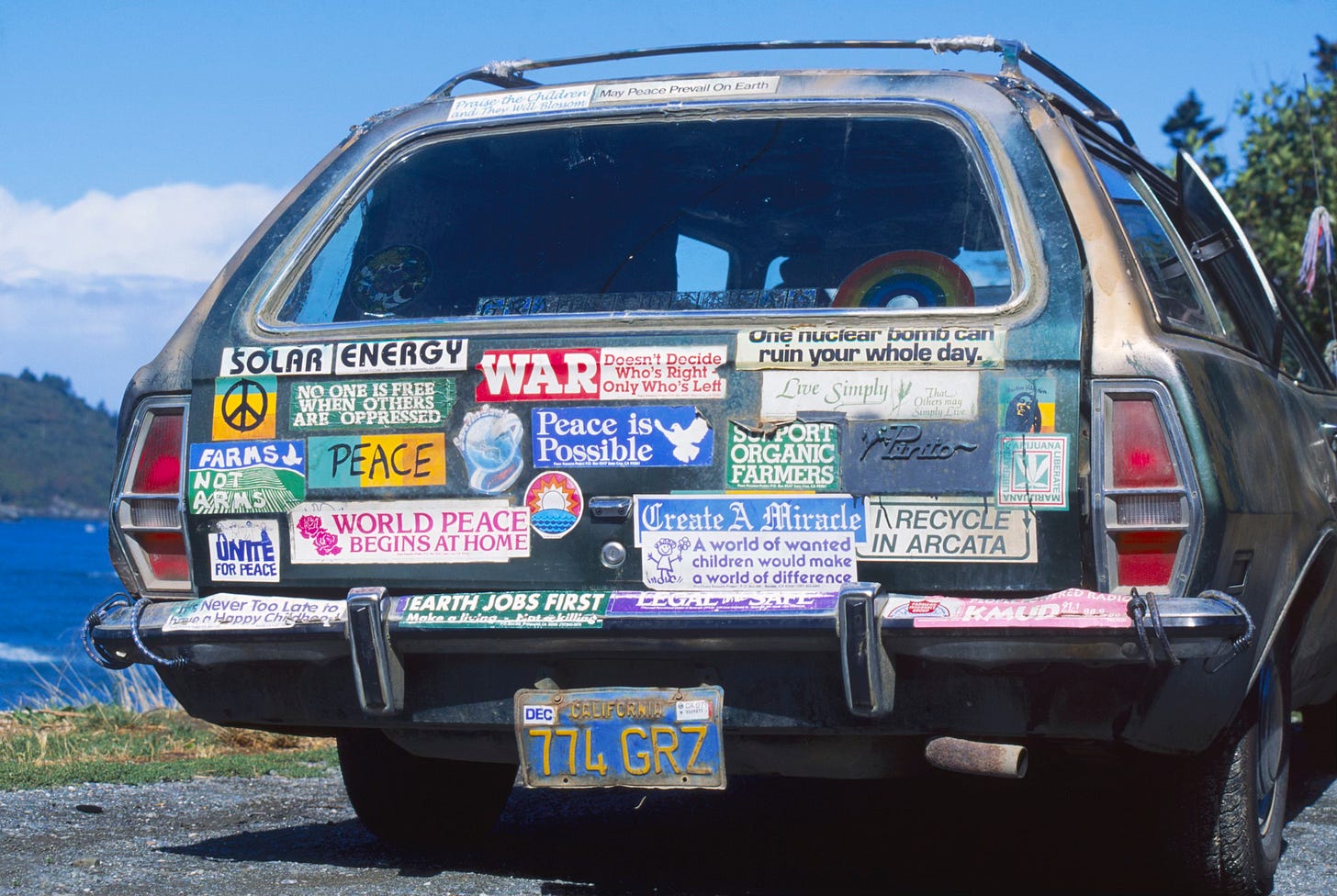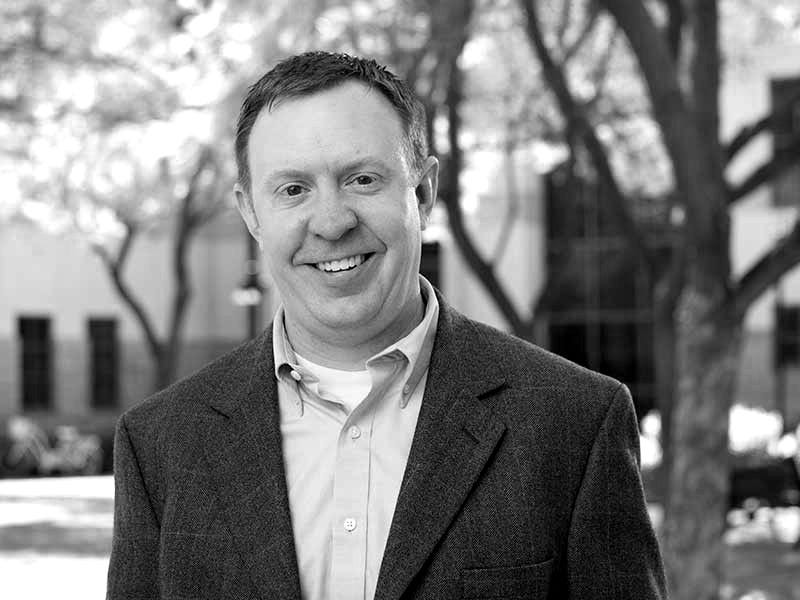Patrick Mason: "Waymaking in the Restoration"
Russell M. Nelson once declared "Peace is Possible!" The question is "how"? Waymakers has some ideas ...
I’ve never had a bumper sticker. Mostly it comes from laziness – I don’t want the hassle of having to remove the sticker when I sell the car or decide I don’t like it anymore.
That said, a lot of truth really can fit on a bumper sticker. My uncle had one of my all-time favorites: “One nuclear bomb can ruin your whole day.” Yep.
There’s a real art to capturing a big idea in a short word or phrase. We chose the name “Waymakers” for this new peacemaking initiative because it’s a single word that evokes a lot of meaning while also being slightly ambiguous. What “way” are we talking about? How do we “make” it? And who’s doing the “making”?
As we’ve ramped up preparations to launch Waymakers I’ve three short sayings rattling around in my head, each of which could fit on a bumper sticker.
The first is from the Dutch-American pastor and peace activist A. J. Muste:
“There is no way to peace; peace is the way.”
More than twenty years ago, I earned a masters degree from one of the nation’s leading programs in international peace studies. The program hosts an alumni listserv that includes hundreds of people who are engaged in truly meaningful peacebuilding work all around the world. Normally the listserv is sleepy, with banal posts about jobs, research requests, and upcoming events. That changed on October 7, 2023, when Hamas launched its surprise attack against Israel. Immediately the listserv exploded into a torrent of accusations, recriminations, conspiracy theories, and ad hominem attacks. This wasn’t a comments section on Reddit or X; this was a group of expertly trained peacebuilders who were at one another’s throats. It dawned on me that while our graduate program had provided us with a premier education about the conceptual, theoretical, and analytical aspects of conflict and peace, what it did less successfully was to cultivate in its graduates—both individually and collectively—the dispositions of a peacemaker.
A. J. Muste’s quote now rings in my ears with new urgency. There are many ways to achieving greater peace, in terms of learning concepts and skills. There is both an art and a science to peacemaking, and through training and practice people can learn to become more skillful in practicing it. At Waymakers we will not only talk about peace as an ideal but also provide trainings and workshops to help people become more skillful peacemakers in their homes, workplaces, and communities. It is a lifelong pursuit; I have so much more to learn. The good news is that you can get better at transforming the conflicts in your life in healthy, constructive ways. We will help you do that.
The second bumper sticker-worthy quote comes from the Vietnamese Buddhist monk Thich Nhat Hanh, whom some people called the “Buddhist Martin Luther King.” He wrote:
“If we are not peaceful, we cannot share peace.”
As essential as knowledge and skills are, peacemaking is not just a matter of following a recipe—a pint of conflict resolution, a cup of nonviolent communication, a dash of Gandhi quotes, and voila! you have achieved peace. To be a peacemaker is to embody a certain way of being in the world. This is the inner work that must accompany conceptual knowledge and skills training. Everything we do at Waymakers will be mindful of the necessity of being mindful.
Here I think of the prophet Mormon, whose most powerful sermon on love was directed toward a subset of church members whom he called “the peaceable followers of Christ” (Moroni 7:3). I think of Jesus’s brother James, who wrote that heaven’s wisdom would dawn on those who are “first pure, then peaceable.” James, who grew up in the same household as the Prince of Peace, said that righteousness and justice would be “sown in peace by those who make peace” (James 3:17-18 NRSV). The character we cultivate inwardly will bear fruit outwardly.
My third bumper sticker comes from President Russell M. Nelson. A year after the terrorist attacks of September 11, 2001, as the nation was pursuing war in Afghanistan and then Iraq, he gave a landmark talk in General Conference called “Blessed Are the Peacemakers.” The core of his message was simple:
“Peace is possible.”
For those enmeshed in deep conflict—which is all of us at some point, and might be you right now—the very notion of peace can seem distant, abstract, almost naïve. At Waymakers one of our core values is to cultivate what the expert peacemaker John Paul Lederach called the “moral imagination.” To make our way toward a better, more peaceful set of relationships, first we have to imagine what that might look like. We have to believe in the possibility of peace, no matter how seemingly remote. In short, we must cultivate and zealously cling on to hope.
At Waymakers we will share practical skills and cultivate the inner life of peace. We’ll also share stories about real-life peacemakers, both in the past and in the present. Through the content we share on this newsletter, the Proclaim Peace podcast, and in our in-person gatherings and trainings, like our upcoming REPAIR workshops, we’ll show that actual people, whose lives are just as messy and broken and complex as yours and mine, have found a way to make a way. Waymakers are real people, not saints or angels.
“There is no way to peace; peace is the way.”
“If we are not peaceful, we cannot share peace.”
“Peace is possible.”
It’s not as easy as slapping a bumper sticker on the back of your car. But there is a way to peace, and we can make it together. Welcome to the community of Waymakers!
Want to join the Waymakers community and get started building peace?
Come join us at our inaugural gathering, REPAIR, on October 23-25 in Provo, Utah. We will have amazing peacebuilders — a keynote by Jim Ferrell and workshops by Jennifer Finlayson-Fife, Thomas McConkie, Jennifer Walker Thomas, and Emma Addams from MWEG, Chad Ford, Desmond Lomax, LaShawn Williams, David Pulsipher, Seamus Fitzgerald, Amanda Ford, Melissa Mason and One America — to help you navigate the most challenging conflicts in your life.
Come to one workshop. Or, go to all four. Find peace inside, at home, or in your ward or community. And connect with a bunch of other people who really care about making peace in the world.
Check out our series of short videos we created, Where Peace Begins, where conflict experts tell stories of conflict from their own lives and how they were able to successfully navigate them. The stories are both inspiring and offer some practical assistance for the thorniest conflicts.
Take in one of the 36 Proclaim Peace podcasts hosted by me and Jennifer Thomas. We tackle a lot of different topics with expert guests on peacemaking.
If you haven’t already, subscribe to our newsletter. You’ll get great weekly content, new episodes from the next season of the Proclaim Peace podcast, and updates on a bunch of events we have planned!
If you already subscribed, would you feel comfortable sharing this with a family member or friend? The more people we can call to this work, the better!
We are so excited that you are with us on this journey. The world needs more waymakers.
PATRICK Q. MASON is a devout Christian peacemaker who combines intimate knowledge of Christian theology and history with the practical skills of a peacemaker.
Patrick holds the Leonard J. Arrington Chair of Mormon History and Culture at Utah State University. He has written or edited several books, including Restoration: God’s Call to the 21st Century World; Proclaim Peace: The Restoration’s Answer to an Age of Conflict and Planted.
He was a Fulbright Scholar in Romania in 2015 and is a past president of the Mormon History Association. Patrick is frequently consulted by the national and international media on stories related to Mormon culture and history. He teaches courses on Mormonism, American religious history, and religion, violence, and peacebuilding.






Perhaps it was intentional, but the phrase "The Way" was the original brand for Christ's teachings. In the decades immediately following Jesus’s ministry, his followers and their beliefs were often referred to as “The Way.” This is supported by the New Testament and early Christian history.
Biblical References
• In the Book of Acts, several passages refer to Christians and their faith as “the Way.”
• Acts 9:2: Saul seeks to arrest any belonging to “the Way.”
• Acts 19:9, 23: mentions some speaking against “the Way” and an uproar about “the Way.”
• Acts 24:14, 22: Paul refers to worshiping God “according to the Way.”
These verses indicate that before the term “Christian” became widely used (Acts 11:26), early believers identified themselves and their discipleship to Jesus as “the Way.”
A Waymakerin addition to the references in the above post to other religious belief systems, is one who follows and love The Way.
I can’t tell you how thankful I am for the work you are doing. I am sharing your with others in my community, and they are so touched by the messages you have shared in podcasts, videos, and articles. Thank you, thank you.